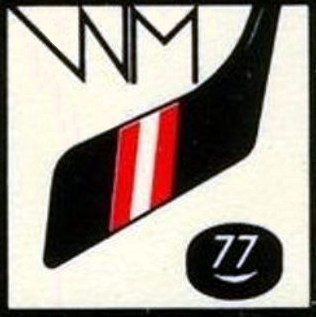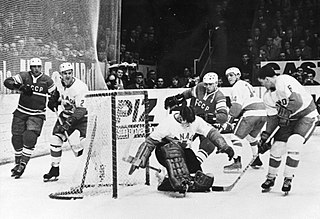
The Ice Hockey World Championships are an annual international men's ice hockey tournament organized by the International Ice Hockey Federation (IIHF). First officially held at the 1920 Summer Olympics. The IIHF was created in 1908 while the European Championships, the precursor to the World Championships, were first held in 1910. The tournament held at the 1920 Summer Olympics is recognized as the first Ice Hockey World Championship. From 1920 to 1968, the Olympic hockey tournament was also considered the World Championship for that year.

The men's tournament in ice hockey at the 2006 Winter Olympics was held in Turin, Italy, from 15 to 26 February. Twelve teams competed, with Sweden winning the gold medal, Finland winning silver, and the Czech Republic winning bronze. It was the third Olympic tournament to feature National Hockey League (NHL) players and the tenth best-on-best hockey tournament in history. United States defenseman Chris Chelios set a standard for longest time between his first Olympic ice hockey tournament and his last—he had competed twenty-two years earlier at the 1984 Olympics. The old record was set by Swiss hockey player Bibi Torriani. who had played twenty years after his debut.

The 1965 Ice Hockey World Championships took place in Hakametsä, Tampere, Finland, 3–15 March. Eight teams took part, each playing each other once. The Soviets became world champions for the fifth time, winning all of their games. This also counted as their ninth European title, with the Czechs finishing second and the Swedes third. For the third straight year Canada finished fourth. The tournament employed new tie-breaking rules, which some believed were supposed to be in place for the Innsbruck Olympics. To decide medals priority would be given to the team who won the head-to-head game, unless they tied, or more than two teams were tied. In those two cases goal differential would be used, but only the goal differential between the top four teams.
The 1996 Men's Ice Hockey World Championships was the 60th such event sanctioned by the International Ice Hockey Federation (IIHF). Teams representing 36 countries participated in several levels of competition, with Slovakia making their first appearance in the top Champions Group A, in their fourth tournament since the dissolution of Czechoslovakia and the formation of the separate Czech Republic and Slovakia men's national ice hockey teams. The competition also served as qualifications for group placements in the 1997 competition.

The 1994 Men's Ice Hockey World Championships was the 58th such event sanctioned by the International Ice Hockey Federation (IIHF). Teams representing 35 countries participated in several levels of competition, with an additional two national teams failing to advance from a mid-season preliminary qualifying tournament. The competition also served as qualifications for group placements in the 1995 competition.
The 1992 Men's Ice Hockey World Championships was the 56th such event sanctioned by the International Ice Hockey Federation (IIHF). Teams representing a record 32 countries participated in several levels of competition. The competition also served as qualifications for group placements in the 1993 competition.
The 1989 Ice Hockey World Championships took place in Sweden from 15 April – 1 May. The games were played in Södertälje and Stockholm, in the newly built arena Globen. Eight teams took part, and each team played each other once. The four best teams then played each other again. This was the 53rd World Championships, and also the 64th European Championships. The Soviet Union became world champions for the 21st time, and also European champions for the 26th time.
The 1987 Ice Hockey World Championships was the 52nd such event hosted by the International Ice Hockey Federation. It was also the 63rd European Championships. Teams representing 28 countries participated in four levels of competition.

The 1985 Ice Hockey World Championships took place in Prague, Czechoslovakia from 17 April to 3 May. Eight teams took part, with each team playing each other once. The four best teams then played each other once more with no results carrying over, and the other four teams played each other again to determine ranking and relegation. This was the 50th World Championships, and also the 61st European Championships of ice hockey. The home side, Czechoslovakia, became world champions for the 6th time, and the Soviet Union won their 23rd European title. For the European Championship, only games between European sides in the first round are included.

The 1977 Ice Hockey World Championships took place in Vienna, Austria from 21 April to 8 May. Eight teams took part, first playing each other once, then the four best teams advancing to a new round. The tournament was also the 55th ice hockey European Championship. Czechoslovakia won for the fifth time, and second in a row, claiming their 14th and final European title as well.
The 1976 Ice Hockey World Championships were the 43rd Ice Hockey World Championships and the 54th European Championships in ice hockey. The tournament took place in Poland from 8 to 25 April, and the games were played in Katowice. Eight teams took part in the main tournament, with each team first playing each other once. The four best teams then took part in a medal play off, and the teams placed 5–8 took part in a relegation play-off. The teams took the results from the first round through to the second round with them.
The 1975 Ice Hockey World Championships were the 42nd Ice Hockey World Championships and the 53rd European Championships of ice hockey. The tournament took place in West Germany from 3 to 19 April and the games were played in Munich and Düsseldorf. Six teams took part in the main tournament, each playing each other twice. The Soviet Union won all of their games, and became World Champions for the 14th time, and won their 17th European title.
The 1972 Ice Hockey World Championships was the 39th edition of the Ice Hockey World Championships. The tournament was held in Prague, Czechoslovakia from 7 to 22 April 1972, and the Czechoslovakia national team won the tournament, the third time they had done so and first since 1949, ending the Soviet Union's streak of nine consecutive titles. In addition it was the Czechoslovaks' 12th European title.

The 1967 Ice Hockey World Championships was the 34th edition of the Ice Hockey World Championships. The tournament was held in Vienna, Austria from March 18 to March 29, 1967. The Soviet Union won the tournament for the fifth straight year, Sweden won the silver medal, and Canada claimed the bronze medal.

The 1966 Ice Hockey World Championships was the 33rd edition of the Ice Hockey World Championships. The tournament was held in Hala Tivoli, Ljubljana, SR Slovenia, SFR Yugoslavia from 3 to 14 March 1966. For the fourth straight year, the Soviet Union won the tournament. For the Soviets, it was their sixth World and tenth European title. Czechoslovakia beat both Canada and Sweden two to one, to take the Silver, while the Swedes' historic loss to East Germany helped put them fourth behind Canada for the Bronze.
The 1963 Ice Hockey World Championships was the 30th edition of the Ice Hockey World Championships. The tournament was held in Stockholm, Sweden from March 7 to March 17, 1963. The Soviet Union won the tournament for the third time, starting their roll of nine straight championships. For the Soviets it was also their seventh European title.
The 1962 Ice Hockey World Championships was the 29th edition of the Ice Hockey World Championships. The tournament was held in Colorado Springs and Denver, United States from 8 to 18 March 1962. This was the first World Championship hosted in North America that was not part of ice hockey at the Olympic Games. It also remains the only IIHF World Championship ever held in the United States that was not also part of the Olympics.

The 1955 Ice Hockey World Championships was the 22nd edition of the Ice Hockey World Championships. The tournament was held in Düsseldorf, Dortmund, Krefeld and Cologne, West Germany from February 25 to March 6, 1955. A total of 14 nations participated in this World Championship, which was a new record for the postwar era. As a result, the teams were seeded with the strongest 9 teams placed in Pool A and the remaining 5 nations as well as the West German B team placed in Pool B.

The 1958 Ice Hockey World Championships were held between February 28 and March 9, 1958, in Oslo, Norway at the Jordal Amfi arena. The Whitby Dunlops represented Canada, winning the World Championship for the 17th time. The Soviets lost the final game to the Canadians 4–2, settling for both silver and their fourth European Championship. Scoring leader Connie Broden is the only player to win the Stanley Cup and the World Championship in the same year, having played on the Montreal Canadiens' championship team.

The 1959 Ice Hockey World Championships were held between 5 March and 15 March 1959, in Prague, and six other cities in Czechoslovakia. Canada, represented by the Belleville McFarlands, won their 18th World championship, winning every game but their last. The Soviet Union finished second, claiming their fifth European title followed by the host Czechoslovaks. In the consolation round, West Germany played against East Germany for the first time in a World Championship, winning easily, 8–0. The Canadian games were broadcast on CJBQ radio by Jack Devine.









